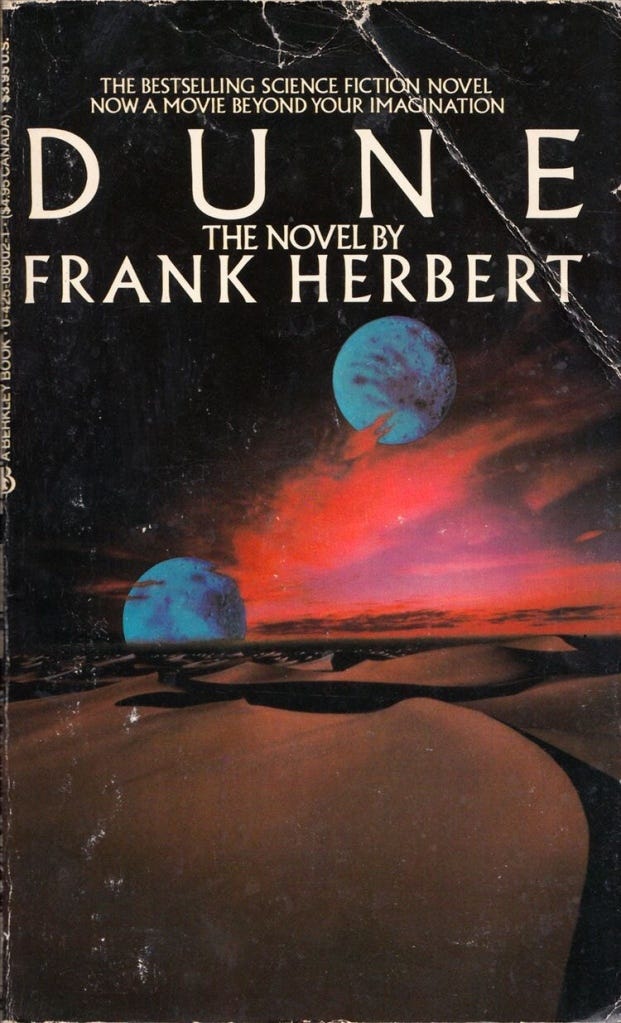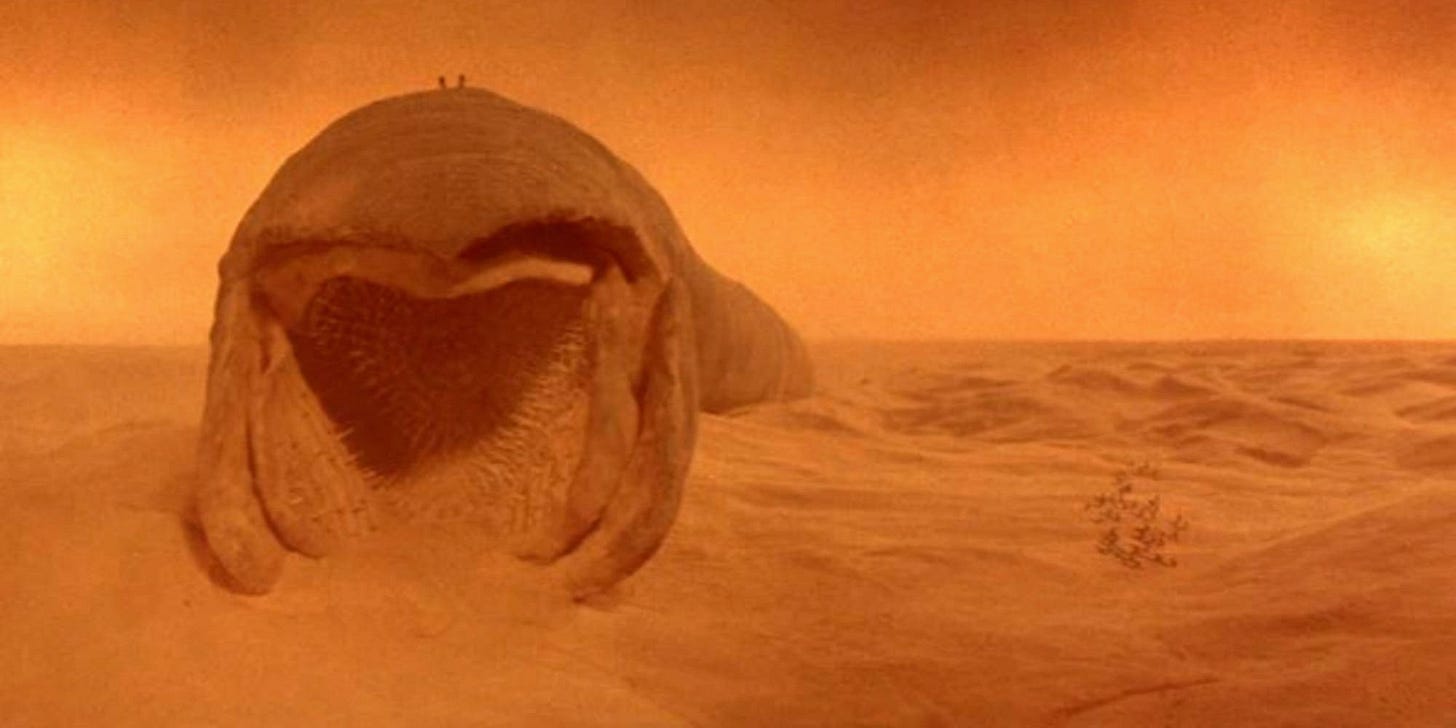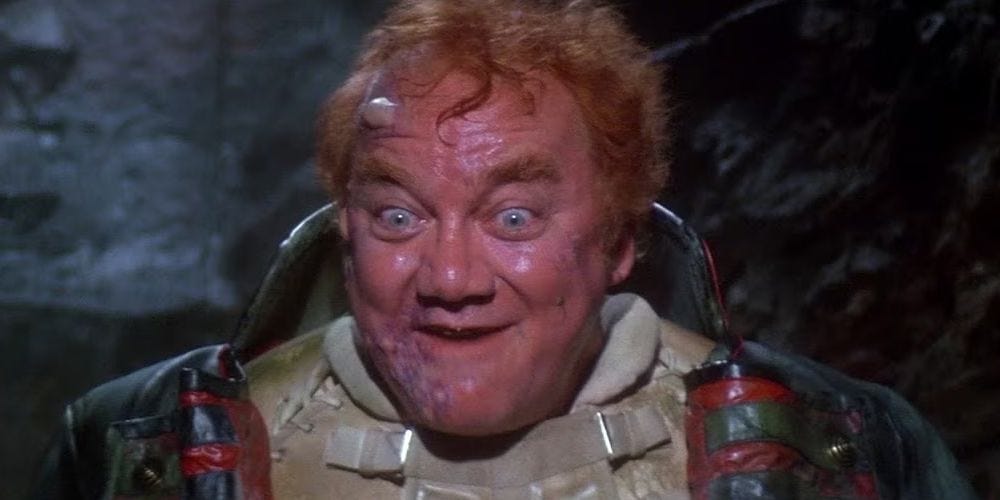Revisiting David Lynch's Dune
A semi-book/movie review
“The beginning is a very delicate time.”
— Princess Irulan, Dune
I remember when I initially read Frank Herbert’s Dune as a child. As many readers do (or at least this particular reader), picking up a well-loved novel leaves an indelible memory of the time period of that original moment when they escape into the author’s created world; the characters and landscape leaping off the pages into one’s imagination. Conjuring up images of an endless desert planet, I could smell the Spice1 and see gigantic sand worms prowling the landscape. The power struggle amongst the noble Houses of Atreides and Harkonnen reminded me of European history.2
A big reason Dune remains my favorite novel that I keep re-reading it is that I continue to get different perspectives and meaning out of the themes presented. When I first read it in adolescence, the sci-fi aspect and the quirky universe that Herbert had built around Arrakis, Paul and the Spice were the biggest draw. Reading it as a young adult fully enmeshed and participating in the Global War on Terror, the geopolitical themes of Spice production as a driving force behind conflict in the universe on an obscure desert planet was not missed.
Now when I read it, I see the deeper themes of philosophy, politics, and hierarchy. It clearly shows Herbert spent years researching and refining his Magnum Opus. Theories presented on the dangers of machine thinking (AI?) and what it truly takes to survive as a civilization resonate in the current age. With six books in Herbert’s Dune series, it is a highly quotable work that examines deep questions still wrestled with today regarding man’s position and purpose in the world.
Before I get into my thoughts on David Lynch’s 1984 movie adaptation, let me recommend an excellent book to those who want to delve deeper into the lore that brought the Dune books to life: “Dream of Dune” a biography by Frank Herbert’s son Brian. Not only does this biography pull back the curtain on what inspirations helped shape the Dune Universe, but also gives a sometimes unflattering, but honest reflection of a man’s life by his son. Brian Herbert recounts his dad’s early years, careers he held, and the number of ups and downs that life gives us all, but he never veers into deification or false platitudes about Frank Herbert as a human being. He doesn’t leave out the things that most would in a sort of fear that telling the whole story might detract from the man, and I appreciated that fact. Learning the multiple influences that went into the Dune series from Herbert’s personal life helped broaden my understanding of how he developed a lot of the ideas and concepts that made it into the book series.
David Lynch
In retrospect, David Lynch (1946-2025) was an interesting choice as director for Dune at the time.3 Although known now as a legendary director with a rich portfolio of film and television work, he had directed just two full-length movies Eraserhead and The Elephant Man before Dune. Yet these previous movies were exactly why producer Raffaella De Laurentiis contacted Lynch with the opportunity after seeing the unique style Lynch employed making those films.
How ambitious it was.
It needs to be remembered in this timeframe how different a story Dune was for a big studio movie adaptation. Space Witches? Sandworms? Psychedelic Spice and a holy war in outer space? Others would have ran from the source material as an idea for a feature length movie. At best, maybe a cartoon version of this galactic opera. Broadly speaking, major movies of the time followed a well-beaten path and formula.4 Lynch’s attempt to bring Herbert’s vision to life can be seen in the scope and scale of the film. Even with the flaws (which we’ll get to soon enough) it can’t be denied the respect for this version of Dune.
Things done well
One aspect done very well was the creativity of the set pieces, costumes, and technological designs. I’ve re-watched Lynch’s Dune several times and still find new details every time, showing how much care the creative team took when making the film. A good example are the uniforms of the different Houses that are depicted onscreen. The uniforms of House Atreides reflects the proud tradition and martial discipline they carry from their history and the ancestral respect held. Likewise, House Harkonnen oozed treachery and deceit in their brutal style of dress. The regal ceremony of dress for the Bene Gesserit project an air of otherworldliness befitting their stature as the behind the scenes manipulators in the Dune Universe. Planet Arrakis (Dune) native Fremen style of dress and demeanor entirely sell the image that these desert warriors are survivors and have adapted to the harsh environment of Arrakis.
The setting of the story on the Atreides Planet Caladan, Fremen Dune, and the Harkonen world of Giedi Prime were fully fleshed out as living, breathing locations with attention to detail and history. On location filming in Morocco captured the essence of planet Arrakis as a harsh unforgiving desert planet.
It’s easy to dismiss the futuristic space technology depicted on film in 1984 Dune when comparing it to special effects in today’s movie productions, credit has to be given to the multiple unique ideas brought alive on the screen. Especially the opening scene in front of the Emperor where he hosts the Guild Navigator in his portable transport tank in the way they imagined the look of a Guild Navigator constantly exposed to Spice would transform a human was stunning. Practical effects will always have an aesthetic that cannot be duplicated by today’s overuse of Marvel Universe green screen. The Worms, space travel and other aspects were done well for the technical abilities of that time.
Showing how degenerate the Harkonnen were, especially with scenes on their home world Giedi Prime, was quite effective. A dark, foreboding planet cast in darkness and misery, the signs of industrial pollution and grime fully displayed. Scenes of male concubines, midget cow-tenders and heart plugs that could be pulled out like old school beer tabs on the slaves were a very stark way to show the depravity of House Harkonnen. Lynch’s Dune did not shy away from this accurate depiction, as later adaptations tried to tone down these aspects. The Baron Harkonnen’s perversity is on full display in this version.5
The soundtrack by Toto and Brian Eno was otherworldly and spot on for the mood and setting of a foreign time so far in the future. A nice touch from that era of filmmaking to have a dedicated sound team instead of random songs from numerous artists.
What it did Poorly
The casting of some characters was entirely off. Maybe it was the direction given during certain scenes, but Kyle Maclachlan never embodies what I envision for the character of Paul Atreides. Partly due to age differences between Herbert’s Paul Atreides and the movie. In the book, Paul Atreides is 15 and Maclachlan was nearly 25 at the start of filming.
I can’t be too critical on Maclachlan as this was his first film role after appearing on stage productions and playing an extra in the Changeling in 1980.6 The singer Sting cast as the Baron Harkonnen’s nephew becomes a stretch in disbelief, even by Hollywood standards. Others like Patrick Stewart as Gunny Halleck and Everett McGill as Stilgar were outstanding choices.
Also, constant voiceover exposition is a distraction as it is overused during scenes where it isn’t needed. Instead of assisting the audience with plot points, the inside thoughts become almost comical. From Paul musing to himself, to random characters thinking the obvious out loud. This might be a carryover from multiple selections in the book where this occurred.7
Pacing of events from the book8 — One thing future adaptations did right was split up the story into multiple parts. A single 2 or even 3 hour movie is not enough time to properly pace out critical story plots into a coherent picture. I realized after rewatching 1984 Dune how glaring this issue is, as the movie resorts to essentially checking boxes in the mad dash of the last 35 minutes.9
Even with these flaws, the film stands as a worthy endeavor by a talented director and cast, many of whom would go on to greater successes in their careers.
David Lynch’s adaptation of Dune was an ambitious attempt at capturing Herbert’s vision on screen that, while flawed, should be appreciated for the scale and scope it brought to life on film. Highly recommend watching — but read the book first to fully enjoy the work Mr. Lynch put into this film.
If you enjoyed this essay or my other writings, you can show your appreciation by buying me a coffee. If not, becoming a free or paid subscriber is much appreciated.
-Arthur
Over 30 years since first reading Dune, I cannot help but think about Spice when I smell cinnamon as the book describes its scent.
In Brian Herbert’s book “Dreams of Dune” he explains how his father took inspiration from England’s War of the Roses.
Interestingly, Lynch had not read Herbert’s book until he was offered the directing job.
In the sense of any big-budget Hollywood production. Plenty of indie filmmakers were beginning to make their mark.
In the current era, the Baron’s sexual violence and unsavory proclivities would, if depicted, bring down the wrath of the Alphabet mafia.
It needs to be said that to go from being paid $10 as an extra directly into a main character role is an impressive feat. Kyle Maclachlan’s later roles in Lynch productions such as Twin Peaks display how talented he is.
Almost forgivable, as many people not familiar with Herbert’s book would have been lost without the voiceovers. With such a rich and complex story, pamphlets were handed out with story lore and characters at theaters at the time. Imagine getting Cliffnotes before even getting popcorn.
Really, any movie based on a book has this problem. Any story taking over 400 pages to tell cannot be sufficiently presented in a 90 minutes film.
There is a restored director’s cut that runs over 3 hours and helps connect some plotlines that are missed in the shortened version.






As is often the case, the book was better than the movie.
All exactly how I feel about it.
I rewatch it with a new person - every 5 years or so !
Great Essay :) !